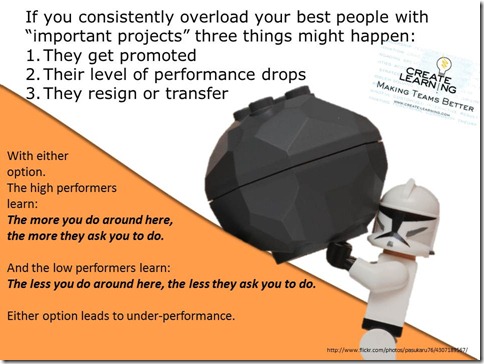
If you consistently overload your best people with “important projects,” three things might happen:
- They get promoted
- Their level of performance drops
- They resign or transfer
With either option, the high performers learn:
The more you do around here, the more they ask you to do.
And the low performers learn:
The less you do around here, the less they ask you to do.
Either option leads to under-performance.
What is a manager to do?
Change your management behavior, start recognizing achievement, and stop recognizing the behaviors employees are displaying that are not desirable.
Have you got an example?
You are the manager. On the team is Jack, who consistently turns his work in late. Being the competent manager you are, you decide to shift some of Jack’s workload to Leticia.
Leticia is your all-star high performer go-to person.
Leticia comes to you and complains about the extra work; you nod and say, “Leticia, I know you can do it. You are the best that we have.”
In your management wisdom, you decide to talk with Jack about underperforming and learn what is going on with Jack and Jack’s life and what he values about his work.
You invite Jack into your office, he sits in the comfy chair, you offer him some coffee, and playing amateur psychologist, ask him about himself.
“Jack, tell me more about yourself” He goes on about his childhood, satisfaction with life and his girlfriend, hope for the future, and the kind of car he would like to drive in 5 years.
You ask Jack, “How might we make this a better workplace? What job do you feel is right for you?” He shares ALL his grand ideas.
BTW: Leticia has walked past your office 5 times and is buried in her work and now Jack’s work; plus, she and you have never spoken for more than 10 minutes.
Your hope, like most managers, is that this discussion will show Jack that you are interested in him and that this interest and concern will increase his on-time work completion.
Jack sees that not getting his work done equals free coffee, the ability to add his input on how things should operate, and spending time in the comfy chair in your office talking about himself.
What is actually happening is that Leticia and all the other team members who do their work see this and recognize all they get is more work and responsibility.
What are you, the manager doing for all the team members who come to work on time every day, complete their tasks on time, and consistently support your goals and work?
Nothing.
Following your managerial behavior, they do not need anything; they do what they are supposed to do every day.
Do you see the problem here?
As your high performers are fleeing and your low performers are staying. You are creating an asphyxiating doom loop.
Give time, attention, and benefit to the behaviors needed for success in the team and work.

